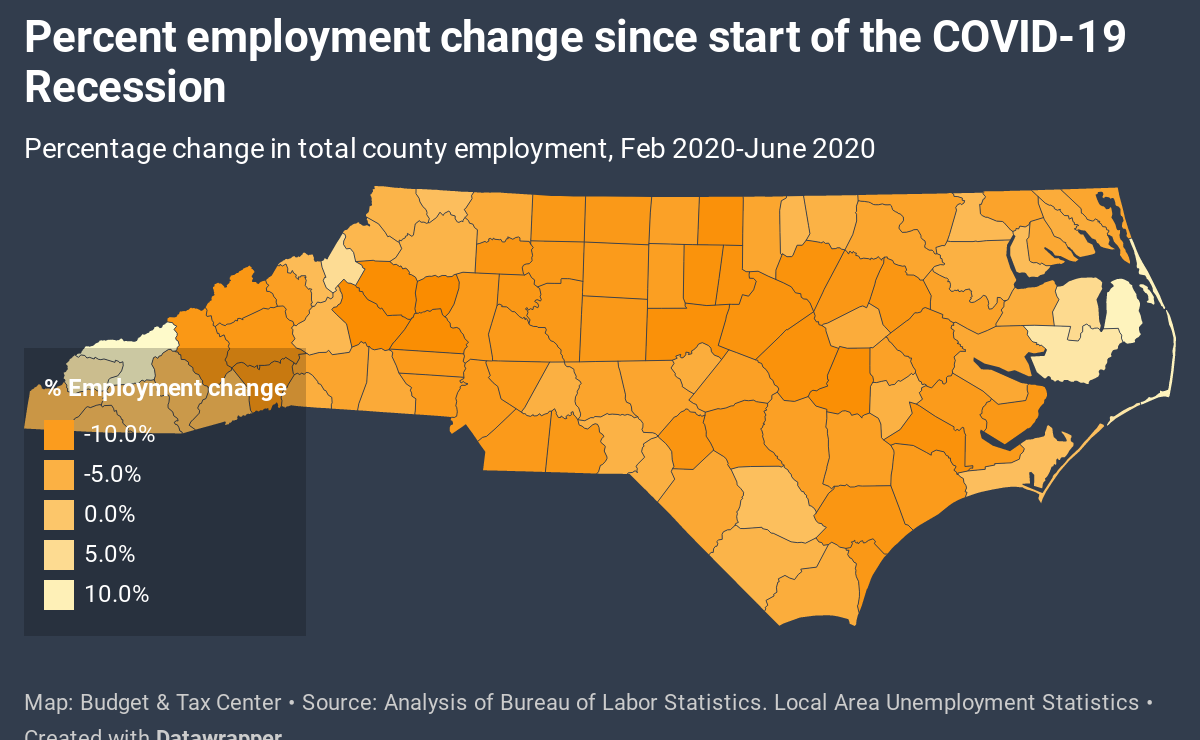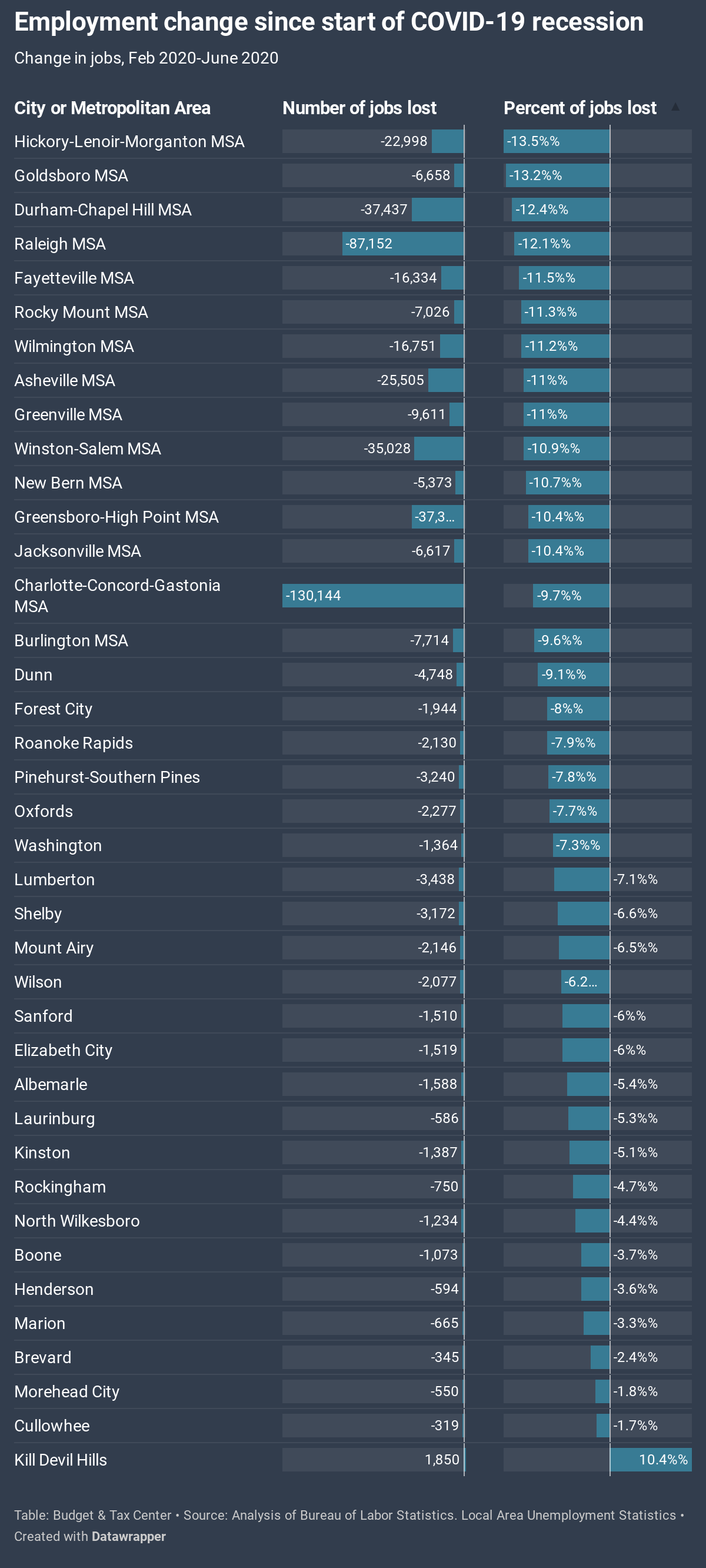North Carolina’s regional employment engines have seen the worst employment losses
RALEIGH (July 29, 2020) — Local labor market figures for June released today show the wave of job losses due to COVID-19 sweeping across North Carolina.
“The ongoing pandemic continues to throttle North Carolina’s economy, and the longer it drags on the more work it’s going to take to rebuild,” said Patrick McHugh, Research Manager with the North Carolina Budget & Tax Center. “Most of our major job centers have lost more than 1 out of every 10 jobs since the pandemic started, and new Unemployment Insurance claims in June showed this recession is hitting people in their prime working years the hardest, which can have a long-term impact on earnings and career opportunities.”
“In counties across the state, the loss of Unemployment Insurance will ripple through communities with significant impacts on the ability of families to cover rent and utilities and put food on the table,” said Alexandra Sirota, Director of the Budget & Tax Center. “The failure of the Senate to act before the deadline and the current proposal from Senate Republicans to cut federal support to jobless workers and complicate state administration of the program will prolong the economic harm to families and communities in North Carolina.”
For daily updates on the number of Unemployment Insurance claims and ongoing analysis of the economic impact of COVID-19, visit NCJustice.org/labormarket
Economic challenges facing North Carolina include:
- Nearly three-quarters of North Carolina’s counties have fewer jobs than before the Great Recession: The staggering loss of jobs due to COVID-19 erased all of the statewide employment gains since the Great Recession in the first two months of the pandemic. Now several months into the pandemic, 73 of North Carolina’s 100 counties still have fewer people working than in 2007 before the Great Recession.
- Nearly half of North Carolina’s counties have lost more than 10 percent of their jobs since the start of the COVID-19 pandemic. Forty-seven of North Carolina’s 100 counties have lost at least 1 out of every 10 jobs that existed before the pandemic.
- People in their prime working years continue to lose jobs, raising potential for long-term consequences: Two-thirds of the new Unemployment Insurance claims filed in June were made by people under the age of 45, and 83 percent of claims were made by people younger than 55. Early- or mid-career job losses often have long-term consequences, leading to potentially permanent declines in income and career opportunities.
- Women continue to suffer more than men: Women were significantly more likely to lose their jobs at the outset of the recession, accounting for 56 percent of the people who filed for North Carolina Unemployment Insurance in April. June Unemployment Insurance claims show women still make up 52 percent of new claimants, continuing a gender inequity that has been present throughout the COVID-19 recession.
- North Carolina’s regional employment engines have seen the worst employment losses. Cities across North Carolina that often serve as the employment hubs for their entire regions have been particularly hard hit by the COVID-19 pandemic. Regional job centers that have seen at least a 10 percent decline in employment compared to before the pandemic include Hickory-Lenoir-Morganton (-13.5%), Goldsboro (-13.2%), Durham-Chapel Hill (-12.4%), Raleigh (-12.1%), Fayetteville (-11.5%), Rocky Mount (-11.3%), Wilmington (-11.2%), Asheville (-11.0%), Greenville (-11.0%), Winston-Salem (-10.9%), New Bern (-10.7%), Greensboro-High Point (-10.4%), and Jacksonville (-10.4%)
For daily updates on the number of Unemployment Insurance claims and ongoing analysis of the economic impact of COVID-19, visit NCJustice.org/labormarket.
For charts showing the most recent labor data, including the context of COVID-19 effects, visit the Budget & Tax Center’s Labor Market page.
For more context on the economic choices facing North Carolina, check out the Budget & Tax Center’s monthly Prosperity Watch report.
The nonpartisan Budget & Tax Center is a project of the NC Justice Center, which works to eliminate poverty in North Carolina by ensuring every household in the state has access to the resources, services and fair treatment it needs to achieve economic security.
FOR MORE INFORMATION, CONTACT Patrick McHugh, Budget & Tax Center Research Manager, at patrick.mchugh@ncjustice.org or 919-856-2183; or Mel Umbarger, Senior Communications Specialist, at mel@ncjustice.org
 Justice Circle
Justice Circle 
